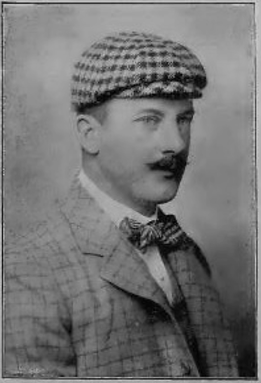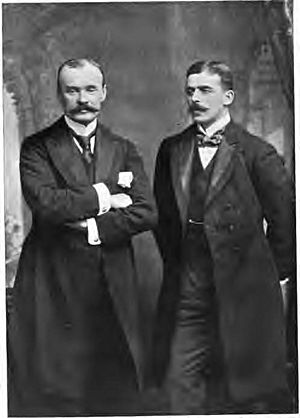James Robert Phillips facts for kids
Quick facts for kids
Acting Consul General Phillips
|
|
|---|---|
 |
|
| Born |
James Robert Phillips
11 September 1863 Ivegill, Cumberland, England
|
| Died | 4 January 1897 (aged 33) Ugbine, Benin Rivers
|
| Nationality | British |
| Occupation | Deputy Commissioner and Consul General |
| Years active | 1891 - 1897 |
| Known for | The Benin Massacre |
|
Notable work
|
Sheriff and Queen's Advocate of the Gold Coast (1891 - 1896) |
James Robert Phillips (1863 - 1897) was a British official. He worked as a deputy commissioner and consul for the Niger Coast Protectorate. This was an area in West Africa controlled by Britain.
Phillips is known for his role in the events that led to the Benin Expedition of 1897. In 1897, he tried to remove the Oba of Benin (the king of Benin) from power. His reasons for this are not fully clear.
As Phillips and his group approached Benin City, they were attacked. Phillips and many others were killed. Even though Phillips had acted without permission, the British government sent a military force. This force defeated the Benin kingdom. This led to the kingdom becoming part of colonial Nigeria, which was controlled by Britain.
Contents
Early Life and Education
James Phillips was born on September 11, 1863, in Ivegill, England. His father was Reverend Thompson Phillips.
He went to Uppingham School, which was a private boarding school. In 1882, he studied law at Trinity College, Cambridge. He trained to become a lawyer in Carlisle.
Phillips also played football for the Eden Wanderers Football Club. His teammates liked him, and he was known for being strong and full of energy.
Working in the Colonies
After becoming a lawyer, Phillips decided to look for work in British colonies. He thought there might be more opportunities for him there.
Gold Coast
In 1891, Phillips became a colonial officer on the Gold Coast. This area is now known as Ghana. He worked as a Sheriff and oversaw prisons. In 1892, he was promoted to Acting Queen's Advocate. This meant he was a senior legal officer.
Niger Coast Protectorate
In 1896, Phillips returned to England for a break. He was happy with his career prospects.
In May 1896, he was appointed deputy commissioner and consul for the Niger Coast Protectorate. He was told by the British government to wait in England. He needed to meet with the main commissioner, Ralph Denham Rayment Moor. They likely met in London in September 1896.
Phillips was a lawyer, and his main job was to improve the prisons and legal system in the Protectorate. He arrived there on October 24, 1896.
On October 31, 1896, he met with traders from the Benin Rivers area. He wanted to introduce himself and hear about their trading problems. He met European traders, Itsekiri chiefs like Chief Dogho, and local traders.
After these meetings, Phillips felt he understood the trading situation well.
The Benin Expedition
Phillips sent a letter to London on November 17, 1896, explaining his views. However, he did not wait for a reply from the British government. He decided to start an expedition to Benin.
Phillips set off from the port of Sapele. He was with six other British officials, two businessmen, translators, and many porters. Some sources say over 500 people were part of this trip. Official records state there were 250 African carriers and nine white men.
The Benin Massacre
On December 17, 1896, Phillips began his journey to Benin from Old Calabar. He sent a message to Ovonramwen, the 36th Oba of Benin (King of Benin). He told the Oba he was coming to visit.
The Oba replied, asking Phillips to delay his visit. He explained that no foreigners could enter the city during important rituals. The Oba also said he was performing a special festival called the Ague Festival. He needed time to investigate claims that the "white men are bringing war to Benin."
However, Phillips did not listen to the Oba's advice. He also ignored pleas from his Itsekiri advisors. On January 4, 1897, he continued with his plan.
Phillips and his group were attacked by Benin warriors led by Ologbosere. This happened on their way to Benin City. Only two Europeans survived this attack. Phillips and at least three other white men were killed during the first attack near Ugbine village. These included Vice Consul Major Peter Wade Grant Copland-Crawford, Dr Robert Hannah Elliot, and Captain Arthur Irwin Maling.
Some believe three other white men were taken as hostages to Benin City. They may have died during the later British attack in February. The two white officers who survived were Captain Alan Boisragon and Ralph Locke. Many African troops, carriers, and servants were also killed.
The British Foreign Secretary, Lord Salisbury, sent a message to Phillips on January 9, 1897. He advised Phillips to postpone the expedition for another year. Lord Salisbury said there were not enough troops available. However, Phillips had already been killed by this time.
What Happened Next
The British Admiralty (the leaders of the British navy) quickly responded to the Benin Massacre. They approved a military mission, known as the Benin Expedition of 1897. This force left in February 1897.
On February 18, Benin City was captured by the British. The Kingdom of Benin was overthrown. It later became part of colonial Nigeria.
The British government also took away the special permission (charter) of the Royal Niger Company. This was because of the Benin events and other complaints. The company sold its land and businesses to the British government for £865,000.
On January 1, 1900, all the company's territories became part of the British Crown. These areas, along with the Niger Coast Protectorate, formed the Northern and Southern Protectorates of the Niger River. In 1914, these two protectorates were joined together. They became the Colony and Protectorate of Nigeria.
Memorials
A special stand for books, called an eagle lectern, was placed in Christ Church, Ivegill, to remember James Phillips. It is now in Carlisle Cathedral. A memorial cross was also put up at the site of the attack to honor the seven Britons who died.
See also
- Colonisation of Africa
 | William L. Dawson |
 | W. E. B. Du Bois |
 | Harry Belafonte |


